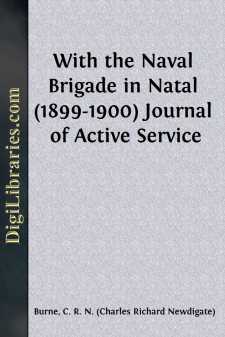Categories
- Antiques & Collectibles 13
- Architecture 36
- Art 48
- Bibles 22
- Biography & Autobiography 813
- Body, Mind & Spirit 142
- Business & Economics 28
- Children's Books 14
- Children's Fiction 11
- Computers 4
- Cooking 94
- Crafts & Hobbies 4
- Drama 346
- Education 46
- Family & Relationships 57
- Fiction 11828
- Games 19
- Gardening 17
- Health & Fitness 34
- History 1377
- House & Home 1
- Humor 147
- Juvenile Fiction 1873
- Juvenile Nonfiction 202
- Language Arts & Disciplines 88
- Law 16
- Literary Collections 686
- Literary Criticism 179
- Mathematics 13
- Medical 41
- Music 40
- Nature 179
- Non-Classifiable 1768
- Performing Arts 7
- Periodicals 1453
- Philosophy 64
- Photography 2
- Poetry 896
- Political Science 203
- Psychology 42
- Reference 154
- Religion 513
- Science 126
- Self-Help 84
- Social Science 81
- Sports & Recreation 34
- Study Aids 3
- Technology & Engineering 59
- Transportation 23
- Travel 463
- True Crime 29
With the Naval Brigade in Natal (1899-1900) Journal of Active Service
Description:
Excerpt
CHAPTER I
Outbreak of the war—The Transport Service and despatch of Army Corps from Southampton—Departure of a Naval Brigade from England and landing at Capetown and Durban—I join H.M.S. Philomel.
During a short leave of absence in Scotland, after my return from Flag-Lieutenant's service in India with Rear-Admiral Archibald L. Douglas, that very kind friend, now Lord of the Admiralty, appointed me (5th October, 1899) to the Transport Service at Southampton, in connection with the embarkation of the various Army Corps for the war in South Africa. As the summons came by wire, I had to leave Stirling in a hurry, collect my various goods and chattels in London, and make the best of my way to Southampton. I reported myself at the Admiralty Transport Office on Monday the 9th, and at once commenced work, visiting certain ships with Captain Barnard, the Port Transport Officer, and picking up the "hang" of the thing, and what was wanted. Captain Graham-White, R.N., came down in the afternoon to take charge of our proceedings. From that date up to the 22nd, or thereabouts, we Transport Lieutenants simply had charge of certain vessels fitting out, and had to inspect for the Admiralty the many freight and transport ships which came in from other centres, such as London, Liverpool, etc., to be officially passed at Southampton; among others the Goorkha and Gascon, two Union Liners, came particularly under me, and I shall always remember the courtesy of their officials, particularly Captain Wait and the indefatigable Mr. Langley, who saw that we transport officers were well looked after on board each day. Everything in connection with this Line seemed to me during my time at Southampton to be very well done, and so our work went swimmingly.
Besides myself were Lieutenants McDonald, Nelson, and Crawford, R.N., as Transport Officers, and we co-operated with a staff of military officers under Colonel Stacpole, D.A.A.G., with whom we got on very well, so that we ran the work through quickly and without a hitch. Sir Redvers Buller left Southampton in the Dunottar Castle on the 15th October, and we all saw him off; in fact, McDonald and I represented the Admiralty at the final inspection of the ship before sailing. There was, of course, a scene of great enthusiasm, and many people were there, among whom were Sir Michael Culme Seymour, Alexander Sinclair his Flag-Lieutenant, and Lady and Miss Fullerton. All this time we were more than busy inspecting and getting ships ready up to the 22nd, when the departure of the First Army Corps commenced; we got away five transports that day within half an hour of each other, all taking some 1,500 men; they were, if my memory serves me, the Malta, Pavonia, Hawarden Castle, Roslin Castle, and Yorkshire; the next few days we did similar work from 8 a.m. till dark, getting away about three ships a day on an average.
During the week Commander Heriz, R.N., and myself, representing the Admiralty, inspected the hospital ships Spartan and Trojan before their start; they had been fitted out under the Commander's superintendence, and were perfect; in fact, one almost wished to be a sick man to try them!...


